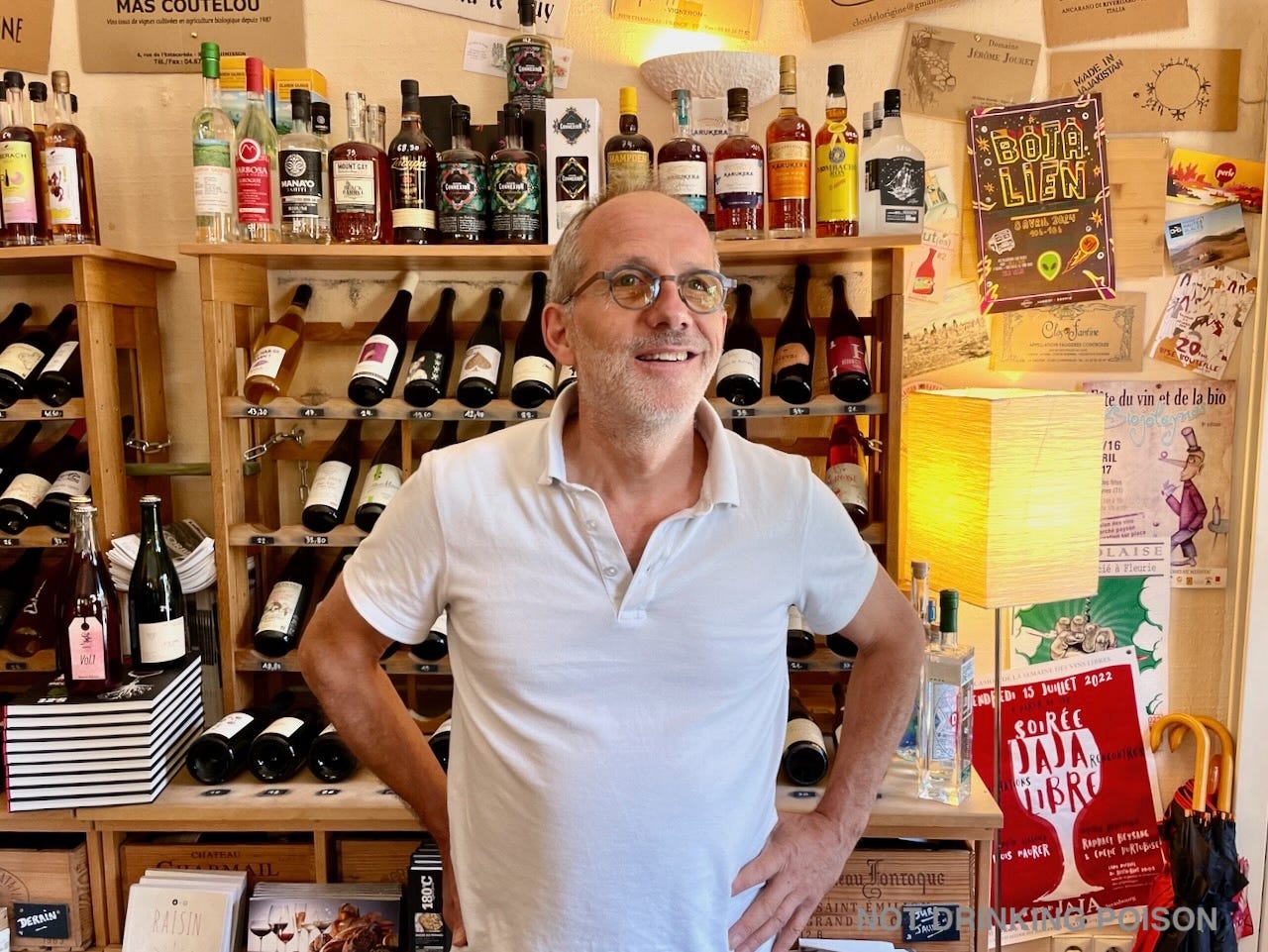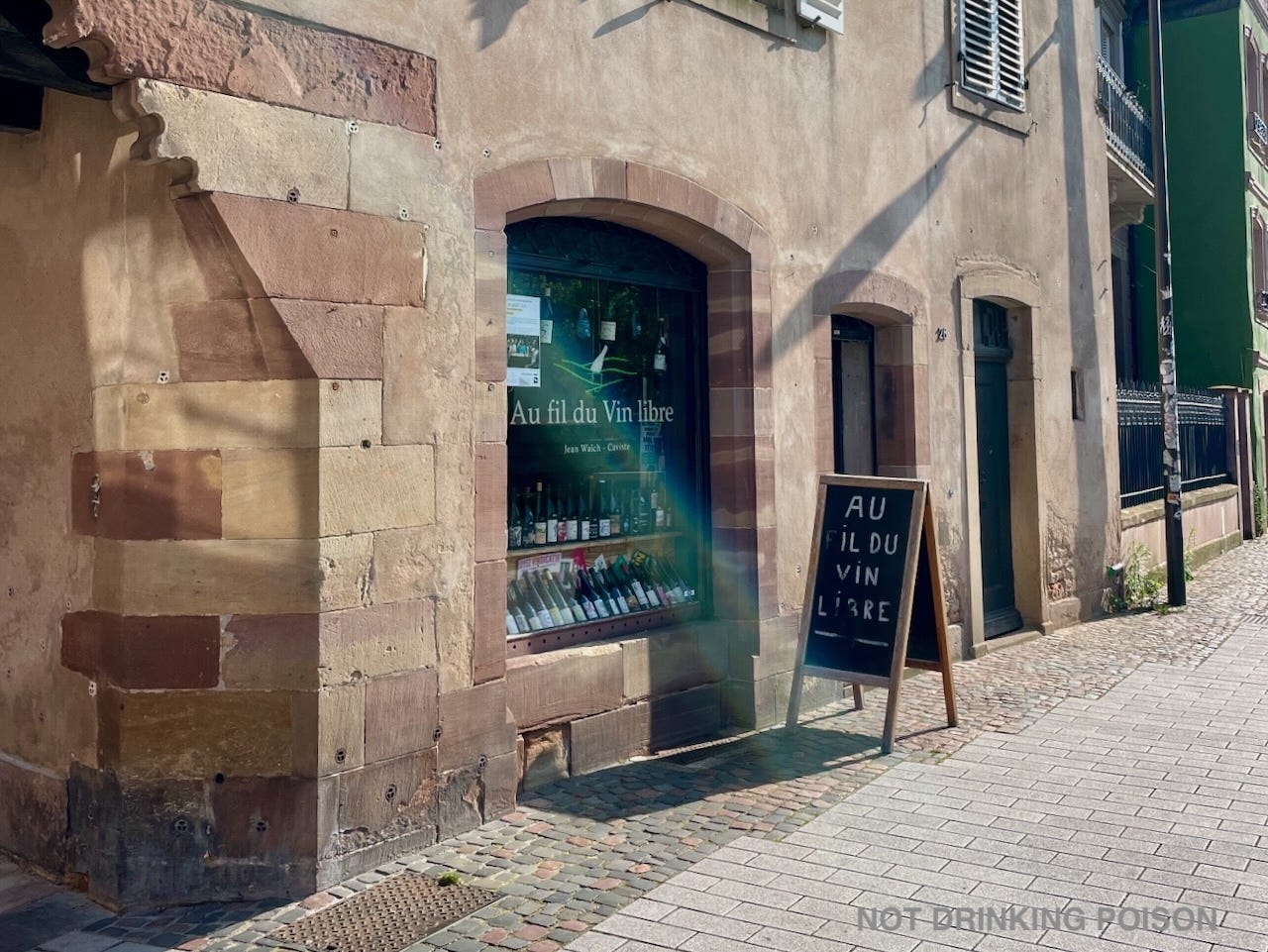Jean Walch of Au Fil du Vin Libre: We Have To Redo the Work
Ten questions for veteran Stasbourg natural wine retailer Jean Walch of Au Fil du Vin Libre.
Riverside Strasbourg natural wine shop Au Fil du Vin Libre is the lair of the eloquent and opinionated Alsatian wine retailer Jean Walch, a multi-talented former pastry chef, cook, and restaurateur.
Walch first encountered the early biodynamic and natural vignerons of Alsace towards the end of the 1990s, when he maintained a restaurant near Nothalten called La Couronne. Since then, starting in 2005 as a sales clerk at Strasbourg wine shop Terres à Vin, and from 2010 at his own, more naturally-oriented shop on the Quai des Bateliers, Walch’s career in wine has accompanied and helped encourage the latter-day efflorescence of Alsatian natural wine.
I only met Walch last January at the Ah! Ah! Ah! salon in the southern Beaujolais, introduced by our mutual friend Corine Andrieu of Clos Fantine. But I’d long admired his thoughtful and occasionally cutting commentary in response to various issues on social media. On a quick trip to the region this past August, I stopped by Au Fil du Vin Libre to chat with Walch about his career in natural wine; natural wine miseducation among the youth; and why, in his selection and his own wine drinking, he emphasizes entirely unsulfited wine.
JEAN WALCH OF AU FIL DU VIN LIBRE: AN INTERVIEW
The following interview was conducted on August 19th, 2024. It has been condensed and edited for clarity.
What did you do before opening Au Fil du Vin Libre in 2010?
JEAN WALCH: I was in restaurants. My first profession was pastry chef, then cook. I had a restaurant. I moved around a lot, I did a lot of seasonal work. I worked in the mountains, on the Côte d’Azur, in Switzerland, in Canada, in Michelin-starred places. I was always passionate about wine. My big friends in restaurants were often the sommeliers. But it was in a traditional wine world.
When I wanted to leave restaurant work, I worked for five years for Eric Demange at Terres a Vins in Strasbourg. He was an avant gardiste [of his time], truly. He was the one who made people here discover vignerons like Marcel Richaud, Philippe Pacalet, Marcel Lapierre, all those people.
Where in Alsace are you from ?
I’m from Erstein. When I was a kid, I went to harvest with my grandparents in Nothalten, and we always spoke of the sun of Erstein, because there was a big sugar factory there. So people called in the sun of Erstein, because it’s what we added when we chaptalized. I have memories of vignerons who bought caddies of sugar in the supermarkets to chaptalize with.
Who were the first Alsace vignerons who inspired you ?
Around 1997-2000, I had a restaurant called La Couronne beside Nothalten, near Patrick Meyer, and he came very often to eat. And so a friendship was created.
Then I met people like André Ostertag, Marc Kreydenweiss, and they were among the kernel of winegrowers who had another approach to viticulture at the time. They were really decried at the time. They had no renown in Alsace, they all sold mostly on export markets.
Au Fil du Vin Libre’s position near the river, on a pedestrian road, reminds me a little of Rosforth & Rosforth in Copenhagen. Does it bring a lot of foot traffic?
When I opened, it was a boulevard and there was a lot of traffic. It was really busy with cars. The quay here was established four or five years ago, and I shouldn’t say this, but for business it’s not good. But we can’t have everything. We can’t reduce the amount of cars on the road and have a less polluted life and [do business the same way].
So I had to adapt. Today I do a lot of deliveries. But there are people who come on bikes, and it’s nice. People regularly ask if they can drink on the quay, and I’ll lend them glasses, and they set up over there. But the French no longer have that reflex, it’s more foreigners. And then today, since I [distribute wine to] a few bars and restaurants, I often send clients there. There’s Jaja, the Café des Sports, and Le Garde Fou - quite a few addresses to drink natural wine in Strasbourg.
Was there a moment in your career as a wine taster where you realized you no longer want to drink sulfited wines?
At some point, I had a revelation through the wines of Patrick Meyer. Something happened, I said I need to understand, I need to see, so I went often to see him, and I no longer managed to drink conventional wines.
At the start I sold the wines of lot of people for whom I still have a lot of respect, like André Ostertag. It’s someone with rigor, who makes great wines, who I respect a lot. But I don’t drink it anymore. For me there’s no more interest in the wines. It happened quite rapidly. It was quite radical, almost physiological. I was sick of not feeling good the next day. I said it’s not normal that the next day we’ll be tired and not good. Wine is meant to be a product that is almost alimentary.
In Paris, over the last ten years, it feels like the schism is more marked, between the lightly sulfited natural-ish wines of an earlier generation of vignerons, and the more radical unsulfited work of later generations. Do you see the same phenomenon?
There were great vignerons who were in the natural orientation, who’ve gone backwards. That’s what is quite revealing about what’s happening today. I don’t know what pressure or why exactly, but I think there’s a form of lobbying somewhere, notably among professionals, the sommeliers who nowadays look for wines that are very square again, with no flaws.
Is it an evolution of society, the mentality? I don’t know. I think about it often. Among my clients at the start, there were some who’d never drunk wine, but who were curious, and little by little, I brought them with me, and they follow me still today, and they’re forty or fifty or sixty years old, and they won’t drink any wines that aren’t natural anymore. But conversely I’m surprised nowadays to meet young people between twenty-five and thirty-five who believe themselves to have a natural wine approach, but who finally were formatted by wines that aren’t natural; they were just told they were natural. That’s a bit the problem of today.
We have to redo the work, almost. We have to once again enlighten a new generation. I don’t like to cite names, but today there are wines that are very sought-after, and people are convinced they’re natural, and it’s not a problem that they’re not natural, but I think it’s important to be honest. To say it.
I find when I’m selling natural wine I don’t even use the word natural. It can provoke a lot of prejudices. Do you find that?
Absolutely. That’s why from the start, for the name of the shop, I wanted something that didn’t claim the term “natural.” For me the term libre [(tr. “free”)] corresponded well, because it corresponded to way I wanted to work. I wanted to be free. I didn’t want to become dogmatic, not in one sense or in the other. It left me a margin of values in connection with that.
But I think the important thing is to stay honest. When people they come in they’re persuaded that it’s all natural. I say no: for me, natural it’s zero [added sulfites]. When there’s 2g, it’s not natural, period. And it’s not grave, but I’ll tell you that there’s 2g. And when they show me photos of things they liked, I say, “That’s not natural, in that there’s 2g, 4g, 5g.” If you liked that, I respect that; happily we have the freedom to like what we want.
What would you say is the percentage of zero-zero wines in the shop at a given times?
It’s difficult to say, but I think maybe a good half the stock. For wines from Alsace, it’s probably about ninety percent.
Alsace is unusual as a region, because it feels like the four recognized pioneers of natural winemaking here - Meyer, Bruno Schueller, Christian Binner, and Jean-Pierre Frick - were all in agreement that natural wine meant zero added sulfites, rather than sometimes a little bit.
Yes. Also I think it helped that many young vignerons who make natural wine here had the advantage of having parents who were already in organics or biodynamics, so the transition was already less complicated than a vigneron who sets up with chemically-farmed vineyards.
I see you often on the wine route in France. Have you explored much over the German border? There’s a whole scene of young natural winemakers in the Rheinhessen and Nahe these days.
I admit to a big deficit of knowledge of German wine. It’s my fault. Doubtless there’s a cultural bias. I’m sixty years old, and twenty or thirty years ago German wine had a reputation that was so catastrophic, there was no reflex to get interested in what was going on there. I knew people from Germany who came to Alsace and bought mountains of wine, because they didn’t drink their own wine. They esteemed that german wine wasn’t qualitative, so they came to get it here. And today it’s no longer the case, indeed.
FIN
Au Fil du Vin Libre - Jean Walch
26 Quai des Bateliers
67000 STRASBOURG
FURTHER READING & LISTENING
What is the Cost of Bargain Natural Wine?
Pierre Dietrich of Pépin: Fighting With the Weapons of Big Wine
Xavier Couturier of DUO Oenologie: Everyone Wants A Recipe
Podcast Ep. 29: Christian Binner of Domaine Binner



